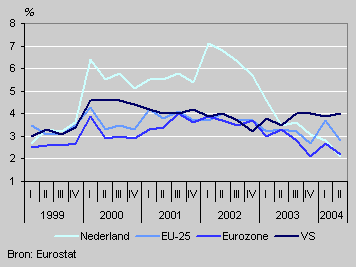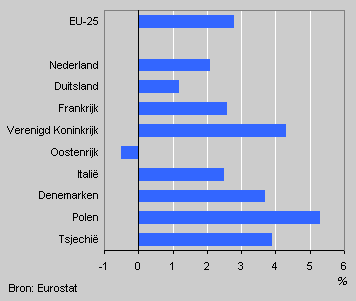Dutch wage costs no longer rising faster than the EU average

The wage costs per hour in the Netherlands during the first six months of 2004 was below the average of the European Union. This brought an end to the four-year period in which Dutch wage costs rose much faster than those of the EU as a whole.
Economic growth pushed wage costs higher
The strong rise in wage costs had to do with the economic developments that were more favourable in the Netherlands than in the surrounding countries. The labour market became very tight, which led to higher wages. The robust economic growth came to an end in 2001, and from 2002 onwards the rise in wage costs levelled off.
Wage costs per hour

Wage costs rise less in the Eurozone than in the USA
The rise in wage costs in the Netherlands during the first six months of 2004 was comparable with that of the Eurozone. The wage costs in the Eurozone have been increasing more slowly than in the USA for more than a year. The competitive edge is dulled by the decrease of the value of the dollar on the euro.
Wage costs per hour, second quarter

The Dutch wage cost increase is one of the lowest in the European Union, after Germany and Austria. Austria even saw a decrease in the second quarter of 2004. The wage costs in most eastern European member states increased far beyond average, because these countries are currently catching up economically.
Rise in social premiums levelling off
Wage costs consist of gross wages and social premiums paid by the employers. In the Netherlands the increase in gross wages in the second quarter of 2004 fell to 2.1 percent. The effects of the wage restraints in 2002 and 2003 were virtually cancelled out by an increase in employers’ premiums. The growth of unemployment and the problems in covering the pension funds have led to a strong increase in the pension and unemployment (WW) premiums.
Social premiums paid by employers (per hour)

In the meantime the greatest increases seem to be over: in the second quarter of 2004 employers premiums rose by a mere 2.2 percent. This brings the Netherlands down to the Eurozone average whereas it had been well above the average in the previous four years.
Hans Langenberg and Hans Terpstra